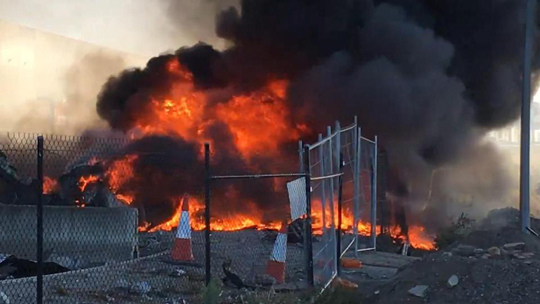Melbourne, Feb 21: A light aircraft exploded Tuesday in a "massive fireball" with police saying none of the five people aboard survived as it smashed into a shopping centre near the Australian city of Melbourne.

The Beechcraft plane veered just after take-off into the shopping centre, that was still closed, next to Essendon Fields airport.
"Five on the aircraft and looks like no-one has survived the crash," said Victoria police assistant commissioner Stephen Leane.
Victoria premier Daniel Andrews described it as the state's worst air accident in three decades.
The private charter from Essendon, north of Melbourne, to King Island, 55 minutes to the south, came down just short of a major motorway packed with the heavy traffic of early morning commuters.
Live television footage showed burned out wreckage, flames and major damage at the shopping centre and adjacent buildings.
A column of thick black smoke rose into the air as witnesses spoke of an explosion.
"It appears a light plane, which is a charter flight, has impacted the DFO (Direct Factory Outlet) at Essendon Fields," police minister Lisa Neville said.
The centre was not due to open for another hour and the authorities confirmed no one inside was hurt.
"There's also debris that's been left on the freeway," she added.
A taxi driver called ABC radio and told of the "massive fireball".
"I saw this plane ... when it hit the building there was a massive fireball," said the man called Jason.
"I could feel the heat through the window of the taxi, and then a wheel -- it looked like a plane wheel -- bounced on the road and hit the front of the taxi as we were driving along."
Victoria police superintendent Mick Frewen said investigations centred on a "catastrophic engine failure".
The flight made a May-Day call before crashing, he added.
A DFO shopworker identified as Ash told Sky News he saw "the fireball go up into the air", adding it "felt like a bomb had gone off".
"The fire was just so hot we could not get anywhere near it," he said. "We could see the wreckage, or what was left of it.
Plumber Michael Howard, 29, told the Australian Broadcasting Corporation he saw a "blue flash".
"I was ... just looking out the window ... and then all of a sudden I just saw a blue flash come down and then all of a sudden there was a massive fireball."
"It was like something from a movie," Howard said.
Melbourne fire brigade chief Paul Stacchino tweeted that "more than 60 firefighters have worked hard to bring the fire ... under control. Crews to remain on scene for some time".
The Australian Safety Transport Bureau said it had sent investigators to the scene.
Essendon Fields had been closed and all traffic diverted to Melbourne's two larger airports Tullamarine and Avalon.
One side of a major freeway which runs alongside the local airport remained shut to allow wreckage to be cleared.





Comments
Add new comment